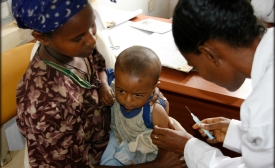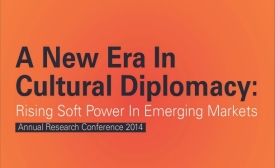soft power
First lady, Michelle Obama is currently visiting China with her daughters, Sasha and Malia and her mother, Marian Robinson. The trip marks the first ever made by a first lady to China without her husband in tow. Mrs. Obama is there to promote educational exchanges between the U.S. and China but she has also subtly been addressing the issue of freedom of expression.

The third volume of the Global Health Diplomacy Series, 21st Century Global Health Diplomacy edited by Thomas E Novotony, Ilona Kickbusch, and
The Sochi Winter Olympic and Paralympic Games have ended. The opening ceremony for the Tokyo 2020 Olympic Games is still more than six years away. As the Tokyo Organizing Committee is forming, this seems like an appropriate moment to think about Tokyo in terms of the recent Sochi experience.
In a speech to Peking University students yesterday, US first lady Michelle Obama defended freedom of expression and other "universal rights" - sensitive concepts that mainland university professors were banned from teaching a year ago. The remarks - the closest the first lady has so far come to discussing politics during her China visit - came during an otherwise soft speech in which she encouraged students to study abroad and cited her own success as a testament to hard work.
Michelle Obama has embarked on a weeklong trip to China, together with her mother, Marian Robinson, and daughters, Malia and Sasha. Critics of the trip point out that the Robinson-Obama visits to Beijing (Great Wall), Xi’an (terra-cotta army), and Chengdu (pandas), will do nothing to illuminate or alleviate tensions in U.S.-China relations.
These are exciting days for those of us who teach and practice public diplomacy. Aimed at establishing mutually beneficial relationships between governments (as well as non-governmental organizations) and citizens of foreign nations, our field is viewed as transformative by some, while somewhat idealistic by others.
First ladies have long been an important part of a nation’s public diplomacy. Now their role is ever more pronounced. In this regard, China’s first lady invites special attention as the country actively courts international public opinion.

Cultural diplomacy is often conceived of as part of a country’s foreign relations, in that cultural dialogue can sometimes achieve what political dialogue cannot. It is an example of “soft power”― the possibility of communicating through culture and ideas to achieve national interests.
In an increasingly distributed global system, emerging-economy countries are now paying greater attention to culture and communication as part of the symbolic domain of their national power in global affairs. But their efforts remain little understood or even noted.







